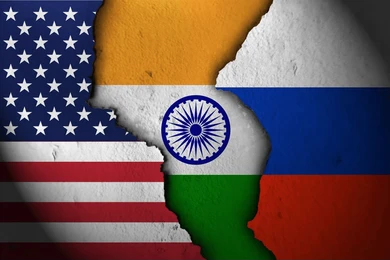With rising tensions between United States and Russia, Trump is giving tough time to India due to its strong ties with Russia. India’s foreign policy is facing a critical moment, as India is trying to maintain a balance between its historic partnership with Russia and its strategic ties with United States. Despite mounting pressure from United States through tariffs and penalty threat, Indian government decided to continue oil purchase from Russia. Amid this situation, India’s longstanding doctrine of strategic autonomy is being tested like never before.
Washington has repeatedly expressed discomfort over India’s continuing reliance on Russia, particularly in energy sector. India’s oil trade with Russia is a point of irritation for United States. US President Donald Trump initially announced 25% tariffs on imports from India and in addition to that Trump also announced penalties for country’s defense and economic ties with Russia. But later on, on Wednesday 6th August, Trump doubled the US tariffs on India to 50%, which will come into effect from 27 August. Moreover, in an interview Trump called India, “not a good trading partner”. According to President Trump, India is financing war against Ukraine by importing oil from Russia.
India’s Response to Tariffs
The statement issued by Ministry of External Affairs India, is considered as a firm response. According to the statement, Indian imports are meant to ensure predictable and affordable energy costs to the Indian consumer. It also criticized U.S. on continues imports from Russia. In this context, Ministry of External Affairs states that targeting India is as unjustified and unreasonable and India will take all necessary steps to safeguard its national interests and economic security. In response to that, India put its plan on hold to buy new US weapons and aircraft after President Trump tariffs on Indian exports.
India’s ties with US and Russia
India’s ties with Russia date back to Cold War era when Soviet Union play an important role in supporting Indian industrial and economic growth. Nowadays, Russia remains a key strategic partner for India, particularly in defense and energy. Moreover, Russia is one of India’s largest defense suppliers and India is also a major importer of Russian oil. According to the reports, this year, India imported about 1.75 million barrels per day of Russian oil from January to June.
At the same time, India’s relationship with US has expanded dramatically. Over the past two decades, US has become India’s largest trading partner. Both countries have signed several foundational agreements to strengthen military and intelligence cooperation. US actively participated in India’s arms procurement programs and also maintained a partnership in space, semiconductors, and digital infrastructure.
Balancing Pressures and Benefits
But the support from United States comes with conditions. The United States was eager to access India’s expanding markets while India relied heavily on exports to US, making it mutually beneficial to preserve strong trade ties. Another major concern of United States is that India’s oil purchase from Russia undermines the United States sanction policy on Moscow.
In order to maintain a balance, India may consider few alternatives. India could make efforts to diversify its military and oil imports by increasing purchases from US and France without immediately cutting off from Russia. India could fast-track its domestic defense manufacturing policy in order to reduce dependency on Russia and U.S. As Prime Minister Modi urged Indian citizens to buy Indian made products in order to protect their economic interests amid unstable global relations. India could boost transparent strategic communication with United States to explain its decisions more clearly, framing its oil imports and defense ties as transitional necessities.
With deep-rooted ties to Moscow and growing strategic interests with Washington, new Delhi is under pressure to pick a side. Each relationship offers critical benefits, as Russia ensures defense and energy security likewise US supports economic growth, technology transfer, and global influence. But maintain relationships with both Russia and US comes at a cost especially when United States pressure intensifies over weapons and oil.
India’s Strategic Autonomy Is Under Pressure
For now, India’s decision is guided by strategic autonomy as it seeks to maintain ties with both US and Russia. However, US may no longer sees India as a part of Indo-Pacific strategy as it was five years ago. The democratic erosion, military shortcomings, and over-concentration on Pakistan have made it less central in US eyes.
In Washington, raising concerns about India’s domestic governance and limited regional military effectiveness that was highlighted in recent May conflict, erodes confidence in India as a long-term security partner. India’s continued trade with Russia despite the Ukraine war, undermine the US efforts when it comes to present India as a strategic counterbalance to China. And India’s overemphasis on Pakistan, undermine its ability to project power against China, which is the core to Indo-Pacific strategy.
So, US is getting close to Pakistan for two strategic reasons: first, to pressurize India in order to accept trade deal which was one of the primary interests of US Secondly, to pull Pakistan from China’s tight embrace. This shift adds another layer of challenges for New Delhi, it was already in a difficult situation due to huge trade deficit with China and Russia, so it stands to lose the important market for its exports.
History suggests that when it comes to U.S. national interest, it could me least bothered about the interests of its allies. Germany’s Nord Stream 2 is a clear example, when US puts pressure on Berlin to block the Nord Stream 2 Pipeline, if Russia escalate the conflict. This event shows that when US national interest is at stake, it could override its close allies.
For India, sustaining its strategic autonomy seems increasingly difficult. As, US is changing its Indo-Pacific strategy, by building ties with Pakistan and showing discomfort over India-Russia ties. Moreover, US is unlikely to accept India’s continued ties with Russia especially if Ukraine war continues. For now, the real challenge for India is not just about maintaining the balance between US and Russia but also to figure out a flexible path in order to preserve its strategic autonomy.
*The views expressed in this article are the author’s own and do not necessarily reflect the editorial policy of TDI.

Farwa Khalid
Farwa Khalid is a student of Peace and Conflict Studies at Centre for International Peace and Stability (CIPS), NUST, and is currently associated with Consortium for Asia-Pacific Studies (CAPS).



